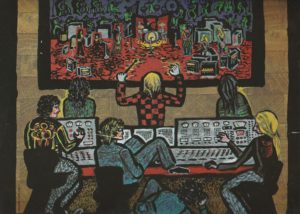A feminist pioneer belts it out:
Grace Slick: Manhole (1974)
Front side of the cover of my original LP (on Grunt label)
Grace Slick was an icon of the youth revolution in the late 1960s.
Was she only a pretty face? No.
If you want a direct ‘time window’ into the end of the hippie era, recorded in 1974, try this LP.
A very under-appreciated album.
Cover back side
“On Manhole, the music is wonderfully dense, macabre, exhilarating, and totally out there. This is a great portion of music from the lead singer of one of America’s great music groups. ” Joe Viglione, Allmusic cf https://www.allmusic.com/album/manhole-mw0000015080
When I listen now, 2019, I still think – like I did when first hearing the album in the 1970s – that Slick often leans too far towards “power” singing, becoming insistent, belting or shouting out her message. When she moderates her voice, things go better.
And yes, now as before, I think the arrangements and melodies sometimes become pompous.
Even so, this is a great album.
The feminist and progressive message is clear. For example, Slick is not singing about some up-above lover, willing to let his charms, like other female artists of the day, including Joni Mitchell (“the big man arrives”..). There is more fire-power here. She sings with the men she loves, instead. Remarkably, her duets with Paul Kantner are among the best material – and the Kantner songs are among the best on the LP.
Manhole has been under-appreciated and downgraded for too long. Even in a recent review, the tendency remains (see e g http://www.thevinyldistrict.com/storefront/2015/07/graded-on-a-curve-grace-slick-manhole/). The reviewer says that when she innovates, it is “obscure”. When she doesn’t, it is stale. Damned if you do; damned if you don’t.
I think she ran circles around most other female singers of her day – they often sound stale and meek, compared to this. Do I like the sound of her singing? I am mixed. Sometimes no. It is too much. Too masculine, even. But is it new? Yes. Is it assertive? Yes. Does it carry a message? Yes. Does it spell artistic freedom? Yes.
Women of the revolution: Janis Joplin and Grace Slick at Woodstock 1969
Manhole needs to be understood in context. It was made at the end of the Jefferson Airplane period, before the band changed into the more commercial and less progressive Jefferson Starship, in the mid-70ies.
Jon Viglione at All music guide describes it fairly well:
“Manhole was the last of the experimental Jefferson Airplane, and Grace Slick’s first official solo album. While Bark and Long John Silver, the final stages of the original Airplane, displayed the excessive psychedelic nature of the musicians within the confines of their group format, Blows Against the Empire, Sunfighter, and Baron Von Tollbooth and the Chrome Nun allowed for total artistic expression. Manhole concluded this phase with 1974’s other release, the Jefferson Starship’s Dragonfly.”
Bark and Long John Silver were rather unsuccessful attempts of the Airplane – after a string of successful innovative albums in the late 60ies, including After bathing at Baxter’s, Crown of creation, and Volunteers. The band realized this, and attempted new formats and groupings from the members of the band – like the spin-off Hot Tuna. The main “reformulation” of the band emerged in the string of LPs mentioned by Viglione – Blows against the empire, Sunfighter, and Baron von Toolboth.
Manhole pushed the concept a little further, until it collapsed. Quite symbolic.
Sometimes, when Grace sings on this album, I am reminded of Tom Jones or other singers when they – to my ears – are overdoing it. Sometimes I can understand why All music guide, despite applause from Viglione, gave it just three out of five stars. Other times, it works really well. Everyone – the guys in the band – are doing their thing. Grace just inserts her voice above them, steering them towards joy and artistic freedom.
The guys are not just the local pub band. David Crosby joins in the best singing on the album. Paul Kantner continues his explorations as lead voice on some of the songs, and contributes on the rest. Jack Casady plays some beautiful bass. Barbata is good on drums, as are many of the other players. When not drowned out by the voice.
All music guide fails to appreciate the string of albums ending with Manhole. It gives Sunfighter just three out of five stars, and Baron... just two. This is ridiculous. These are classic albums, despite their faults. Four to five stars.
Despite its faults, Manhole is a special album, a time window, a testament, and a future teller – today also.
Along the way, Kantner had led the show, now Slick led it.
English is not my native language, so maybe my use of “belt” or “belting” is not the correct term. I don’t want to undermine Grace Slick’s greatness as a singer. Turns out, it does not. On the contrary, learning how to belt, distinct from how to yell, may still make a rock star out of you. Belting, as a form of shouty singing, seems to go back to way back when, in human communication. With belting, you claim a territorry, sound-wise – this is more than the warning shouting or yelling of a tribe, and more than soft singing for the close group – in my interpretation. Compared to opera or classical singing, rock singers use belt voice as part of the repertoire. Growling and grunting can be seen as offshoots.
Variation is the key to Grace Slick as a singer, not just the belting part. The intensity of her voice, whatever the volume or singing style, is fabulously shown in the solo voice recording of White Rabbit – now available on the web:
Grace Slick’s Vocals On ‘White Rabbit’ Are Going Viral And They Will Give You Goosebumps
She did not have a “style” (which was a point, at the time) – this singing is just extremely forceful, climbing slowly towards belting, based on the melody and lyrics.
But arguably, the way she uses her voice is even more masterful on Manhole. “Look up! The roof is gone”, she sings. The old oppression is gone. There are new potentials, new possibilities.




